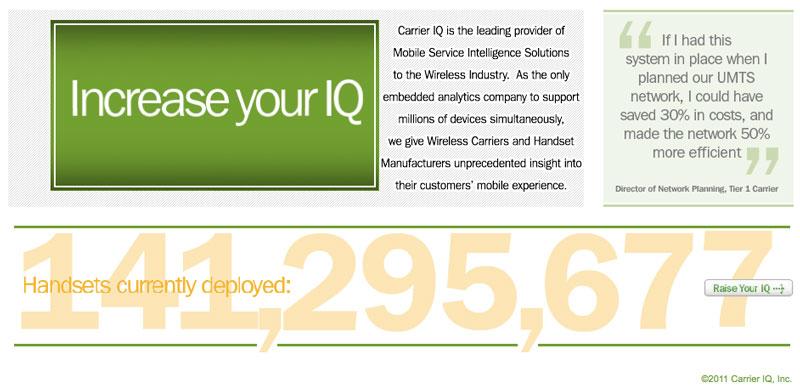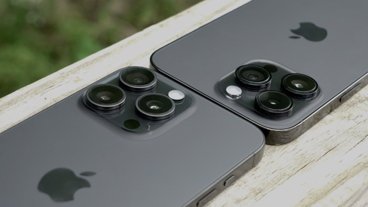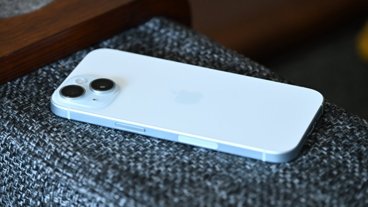Carrier IQ data logging controversy prompts scrutiny from US Senate
Sen. Al Franken, D-Minn., issued a letter on Thursday to Carrier IQ and its CEO, Larry Lenhart, to explain exactly what his company's software records on users' phones and how it works. Franken's concern was prompted by Trevor Eckhart, a security researcher who has been digging into the presence of Carrier IQ on Android devices.
Eckhart uploaded a video demonstrating how Carrier IQ runs in the background on a stock HTC handset, even though the handset is in airplane mode operating only over Wi-Fi. Even though the handset was not connected to the Sprint network, the Carrier IQ software was tracked logging every action on the device, including key presses and even numbers dialed, even if the number was not called.
On the Android device tested by Eckhart, Carrier IQ continued to run and track user activity even though the software did not appear in Android's list of active processes.
The Carrier IQ software has been shown to be able to log extensive information, including when phones are turned and off, the contents of text messages they receive, what websites are visited on a phone, and even location data. Franken has asked the company to explain exactly what is recorded, whether it is transmitted to other companies, and if the company would allow users to stop this data logging.
"Consumers need to know that their safety and privacy are being protected by the companies they trust with their sensitive information," Franken said in a statement. "The revelation that the locations and other sensitive data of millions of Americans are being secretly recorded and possibly transmitted is deeply troubling.
"This news underscores the need for Congress to act swiftly to protect the location information and private, sensitive information of consumers. But right now, Carrier IQ has a lot of questions to answer."
The reach of Carrier IQ extends to Nokia, Research in Motion, and even previous versions of Apple's iOS platform, but research has shown that the logging abilities of the software were not nearly as extensive on Apple's platform prior to iOS 5. iOS hacker Grant Paul, known by his handle "chpwn," revealed in a blog post that Carrier IQ on the iPhone does not have access to the user interface layer, where text entry is done.
"I am reasonably sure it has no access to typed text, web history, passwords, browsing history, or text messages, and as such it is not sending any of this data remotely," he said. That's a stark contrast from Android, however, where Eckhart's tests have shown Carrier IQ's ability to record a great deal of information.
Apple issued a statement on Thursday to All Things D and revealed that Carrier IQ has not been a part of its iOS software since the release of iOS 5 in October, though traces of the inactive software do remain. The company also denied that it has collected any personal information from its users.
“We stopped supporting Carrier IQ with iOS 5 in most of our products and will remove it completely in a future software update," the company's official statement reads. "With any diagnostic data sent to Apple, customers must actively opt-in to share this information, and if they do, the data is sent in an anonymous and encrypted form and does not include any personal information. We never recorded keystrokes, messages or any other personal information for diagnostic data and have no plans to ever do so.â€
For its part, Carrier IQ has said that it is "counting and summarizing performance, not recording keystrokes or providing tracking tools." It claims its customers "have stringent policies and obligations on data collection and retention." The company's website boasts that its software is installed on more than 141 million handsets.
Franken challenged both Apple and Google earlier this year when it was revealed that a detailed log of location data was stored on users' iPhones. Apple explained that the data was stored as a result of a software bug, and quickly addressed the issue with a software update in the form of iOS 4.3.3.
Apple and Google also explained their privacy policies in a public hearing before the U.S. Senate Judiciary Subcommittee on Privacy, Technology and the Law. Bud Tribble, Apple's vice president of software technology, explained that his company makes user privacy one of its highest priorities, and revealed that Apple conducts random audits to ensure that developers follow App Store rules.
While the previous scrutiny from Franken was focused on mobile platforms created by Google and Apple, this latest inquiry could prove to be more about U.S. carriers. The Verge's Nilay Patel reported on Thursday that "pure" Google devices that ship with stock Android, including Nexus phones and the original Xoom tablet, do not include Carrier IQ tracking software.
"Each of those devices was launched in direct partnership with Google as the flagship for a new version of Android, so it seems that the addition of Carrier IQ comes from OEMs and carriers after Google open-sources Android's code," he wrote. "Carriers requiring manufacturers to include Carrier IQ would also explain why references to the software have been found in iOS — Apple works much more closely with carriers since it builds both the hardware and software of the iPhone."
The full text of Franken's letter to Carrier IQ is included below:
Dear Mr. Lenhart,
I am very concerned by recent reports that your company’s software—pre-installed on smartphones used by millions of Americans—is logging and may be transmitting extraordinarily sensitive information from consumers’ phones, including:
- when they turn their phones on;
- when they turn their phones off;
- the phone numbers they dial;
- the contents of text messages they receive;
- the URLs of the websites they visit;
- the contents of their online search queries—even when those searches are encrypted; and
- the location of the customer using the smartphone—even when the customer has expressly denied permission for an app that is currently running to access his or her location.
It appears that this software runs automatically every time you turn your phone on. It also appears that an average user would have no way to know that this software is running—and that when that user finds out, he or she will have no reasonable means to remove or stop it.
These revelations are especially concerning in light of Carrier IQ’s public assertions that it is "not recording keystrokes or providing tracking tools" (November 16), "[d]oes not record your keystrokes," and "[d]oes not inspect or report on the content of your communications, such as the content of emails and SMSs" (November 23).
I understand the need to provide usage and diagnostic information to carriers. I also understand that carriers can modify Carrier IQ’s software. But it appears that Carrier IQ’s software captures a broad swath of extremely sensitive information from users that would appear to have nothing to do with diagnostics—including who they are calling, the contents of the texts they are receiving, the contents of their searches, and the websites they visit.
These actions may violate federal privacy laws, including the Electronic Communications Privacy Act and the Computer Fraud and Abuse Act. This is potentially a very serious matter.
I ask that you provide answers to the following questions by December 14, 2011.
(1) Does Carrier IQ software log users' location?
(2) What other data does Carrier IQ software log? Does it log:
a. The telephone numbers users dial?
b. The telephone numbers of individuals calling a user?
c. The contents of the text messages users receive?
d. The contents of the text messages users send?
e. The contents of the emails they receive?
f. The contents of the emails users send?
g. The URLs of the websites that users visit?
h. The contents of users’ online search queries?
i. The names or contact information from users’ address books?
j. Any other keystroke data?
(3) What if any of this data is transmitted off of a users’ phone? When? In what form?
(4) Is that data transmitted to Carrier IQ? Is it transmitted to smartphone manufacturers, operating system providers, or carriers? Is it transmitted to any other third parties?
(5) If Carrier IQ receives this data, does it subsequently share it with third parties? With whom does it share this data? What data is shared?
(6) Will Carrier IQ allow users to stop any logging and transmission of this data?
(7) How long does Carrier IQ store this data?
(8) Has Carrier IQ disclosed this data to federal or state law enforcement?
(9) How does Carrier IQ protect this data against hackers and other security threats?
(10) Does Carrier IQ believe that its actions comply with the Electronic Communications Privacy Act, including the federal wiretap statute (18 U.S.C. § 2511 et seq.), the pen register statute (18 USC § 3121 et seq.), and the Stored Communications Act (18 U.S.C. § 2701 et seq.)?
(11) Does Carrier IQ believe that its actions comply with the Computer Fraud and Abuse Act (18 U.S.C. § 1030)? Why?
I appreciate your prompt attention to this matter.
Sincerely,
AL FRANKEN
Chairman, Subcommittee on Privacy
Technology and the Law
 AppleInsider Staff
AppleInsider Staff











 Marko Zivkovic
Marko Zivkovic
 Amber Neely
Amber Neely
 Christine McKee
Christine McKee
 Malcolm Owen
Malcolm Owen
 Mike Wuerthele and Malcolm Owen
Mike Wuerthele and Malcolm Owen

 William Gallagher
William Gallagher








